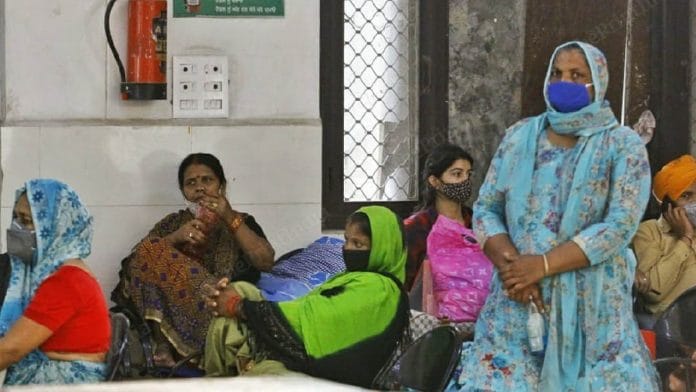New Delhi: A living systematic review by the University of Birmingham has found that vertical transmission of Covid-19 (transmission from pregnant mother to unborn child) is possible, though extremely rare.
The review, published in the British Medical Journal (BMJ), found that less than two per cent of babies get the infection from their mothers, and that severity of disease in the mother is associated with positivity in the child.
A living review means that results will be updated as more and more evidence emerges. This particular study could be updated for up to two years from its date of publication.
“SARS-CoV-2 positivity rates were found to be low in babies born to mothers with SARS-CoV-2 infection. Evidence suggests confirmed vertical transmission of SARS-CoV-2, although this is likely to be rare. Severity of maternal Covid-19 appears to be associated with SARS-CoV-2 positivity in offspring,” the authors wrote in The BMJ.
The review looked at 472 studies and found that overall, 1.8 per cent of the 14,271 babies born to mothers with SARS-CoV-2 infection tested positive in RT-PCR tests.
Of the 592 SARS-CoV-2 positive babies with data on the timing of exposure and type and timing of tests, 14 had confirmed mother-to-child transmission: seven in utero (in the womb), two intrapartum (between the start of labour and delivery of placenta), and five during the early postnatal (after birth) period.
“Of the 800 SARS-CoV-2 positive babies with outcome data, 20 were stillbirths, 23 were neonatal deaths, and eight were early pregnancy losses, 749 babies were alive at the end of follow-up,” the authors wrote.
“Severe maternal Covid-19, maternal death, maternal admission to an intensive care unit, and maternal postnatal infection were associated with SARS-CoV-2 positivity in offspring,” they wrote.
Vertical transmission of Covid has been one of the most feared aspects of the disease. Initially, it was believed that such transmission did not happen at all, but over the two years of the pandemic, that notion has been revised.
In April 2020, India’s apex medical research body ICMR had issued guidelines for management of pregnant women, in which it said vertical transmission was possible.
Also read: Delta was predominant Covid variant among children too during 2nd wave, ICMR study finds
Low overall risk
The researchers found that the trimester of pregnancy, mode of delivery or breastfeeding are not associated with vertical transmission.
“This living systematic review and meta-analysis found that less than two per cent of babies born to mothers seeking hospital care for any reason and with a diagnosis of SARS-CoV-2 infection also test positive for SARS-CoV-2, the rates are lower (one per cent) when limited to babies with antenatal or intrapartum exposure to the virus,” the review said.
“We found evidence for confirmed mother-to-child-transmission through in utero, intrapartum, and early postnatal exposure, but the overall risk is likely to be low,” it said.
“Severity of maternal Covid-19 and postnatal maternal infection seem to be associated with SARS-CoV-2 positivity in offspring, and not trimester of maternal infection, gestation at birth, mode of delivery, breastfeeding, or mother-baby separation at birth,” the researchers wrote.
(Edited by Saikat Niyogi)
Also read: India likely made up more than a third of global infant deaths in Covid slowdown






